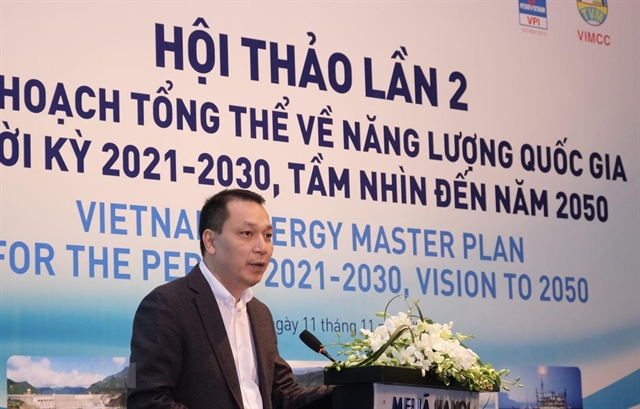Providing a sufficient source of energy to facilitate Viet Nam’s industrialisation and modernisation while also ensuring national energy security remained a challenge as Viet Nam and the region are importing more and more energy.

Providing a sufficient source of energy to facilitate Viet Nam’s industrialisation and modernisation while also ensuring national energy security remained a challenge as Viet Nam and the region are importing more and more energy.
Deputy Minister of Industry and Trade Dang Hoang An delivered the statement at a conference held in Ha Noi on Wednesday.
In this context, Viet Nam’s energy master plan for 2021-30 with a vision to 2050 is expected to build scenarios that will not increase energy costs, prevent energy from becoming a burden of the economy, ensure the nation’s harmonised energy development and contribute to promoting the country’s economic development, An said.
From 1997 to 2019, Viet Nam's economy maintained a growth rate of nearly 7 per cent. Its energy demand in the recent 10-year period increased 6.5 per cent for primary energy while demand for electricity rose 10.5 per cent in the period, he noted.
At the conference, delegates presented the overall energy development plan and sub-sectors planning of oil, gas, coal and electricity.
Nguyen The Thang, Head of the Electrical System Development Department under the Institute of Energy, said that according to the master plan’s base scenario, commercial electricity will reach 490.8 billion kWh by 2030 and 976 billion kWh by 2050, maintaining an increase of 8.3 per cent in 2021-30, then decreasing to 3.4 per cent in 2031-50.
In another scenario, commercial electricity will reach 523 billion kWh in 2030 and 1.110 billion kWh in 2050.
Nguyen Tai Anh, Deputy General Director of Vietnam Electricity said the Ministry of Industry and Trade, the consulting unit to build the energy master plan, should consider adding the import and transportation of LNG gas into the plan while evaluating the model of gas import because gas is not similar to other energy sources.
According to the Ministry of Industry and Trade (MoIT), the master plan will help provide a comprehensive assessment of national energy supply and demand and connect energy development with the socio-economic-environmental development goals set by Viet Nam and its commitments to the international community.
The MoIT set a target that this plan will ensure the harmonious development of energy sub-sectors while also creating favourable conditions for State management activities in the energy sector.
According to MoIT, this is the first time that Viet Nam has built a master plan on energy. Therefore, the planning will face many challenges in synchronising and ensuring compatibility with other plans. Notably, drawing mechanisms for the plan requires the participation of many stakeholders.— VNS





